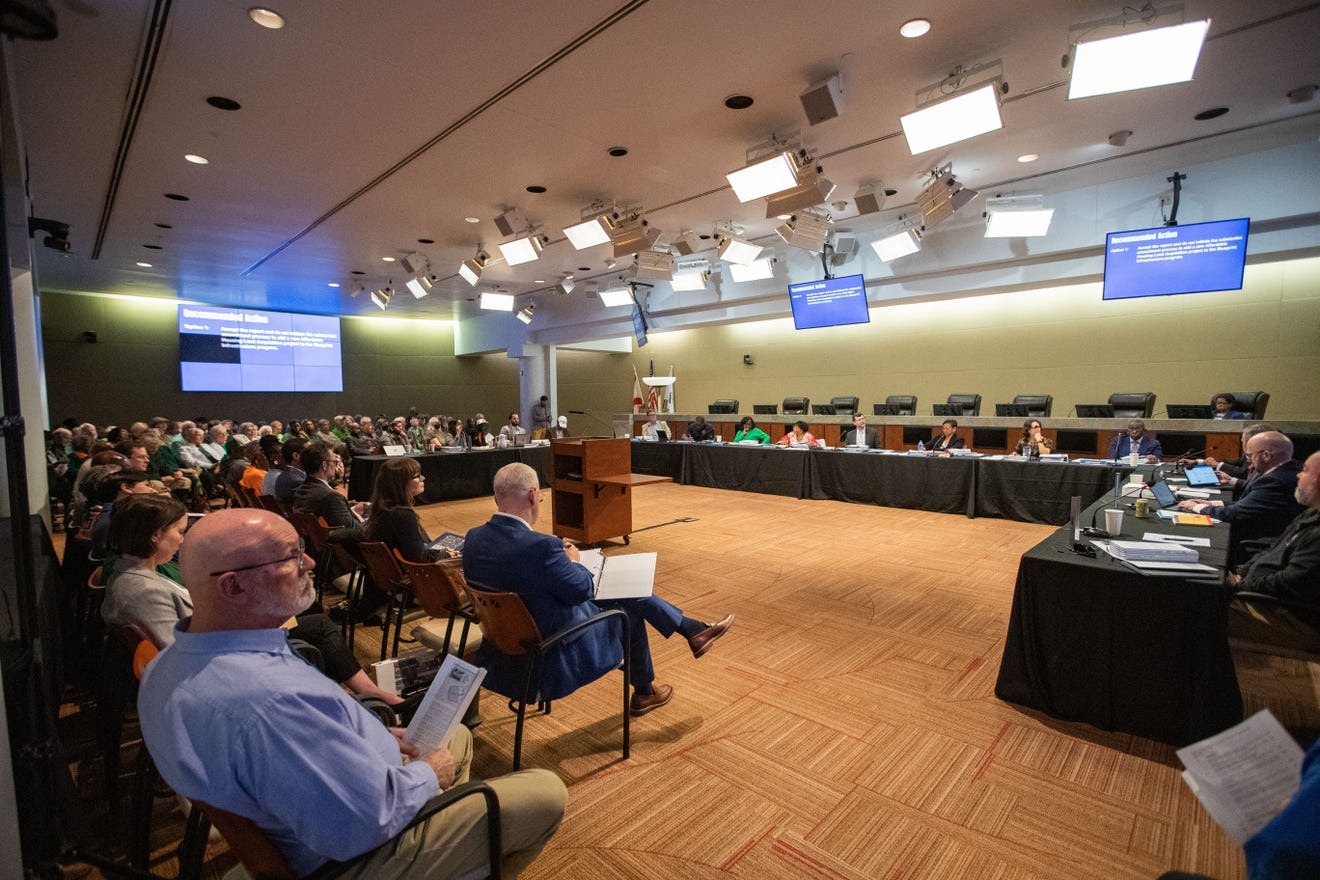By TaMaryn Waters, Tallahassee Democrat
Blueprint board members wrestled with and ultimately decided to initiate a substantial amendment process that could one day lead to sales tax dollars being used for land acquisition for an affordable rental housing program.
From tense debate to dozens of residents standing in solidarity behind speakers, the meeting was full of drama. They came dressed in green and didn’t utter a sound. The Rev. Sylvia Jones, one of four speakers, was first to approach the lectern.
She proclaimed that even with no designated money in sight to fund the unplanned rental housing projects, the group’s “collective faith will ensure that it’s funded. My holy scripture says for nothing will be impossible with God.”
The Capital Area Justice Ministry or CAJM, a network of 20 religious congregations, is advocating local policy changes to address Tallahassee’s anemic supply of affordable rental housing.
Blueprint staff recommended not moving forward with a substantial amendment change and said there was no money to fund additional projects now or in the semi-near future.
The process itself can take a while and ultimate passage is far from guaranteed: It involves two public hearings and input from the Citizens Advisory Committee, the Technical Coordinating Committee and City Manager Reese Goad and County Administrator Vince Long. Finally, the amendment has to get a supermajority vote from the board to pass.
From 2000 to 2040, there are 44 Blueprint projects in the works that are scattered across the county and range from greenways, roads, multimodal improvements and water quality and flooding improvements.
Over the next five years, Blueprint has more than $750,000 worth of project improvements planned — more than half are located on the south side.
Jones said that while staff states adding an affordable housing project may divert money from one or more existing approved projects, she said that’s not what the group wants.
“We are not asking you to do that,” said Jones, co-chair of the group’s affordable housing committee. “We want the projects on the approved lists so that when additional funds become available, you will be able to direct them to land acquisition for affordable rental housing.”
The board, made up of city and county commissioners, ping ponged the pros and cons of applying Blueprint infrastructure money toward the project.
Some stressed the urgency to act while others strongly believed the move was out of step with what voters wanted when they approved more than two dozens projects to be funded by reinstating the Blueprint sales tax.
Here’s what Blueprint Board members said ahead of the 8-4 vote.
County Commissioner Carolyn Cummings
Cummings, who chairs the Blueprint Board, said that each member had to be flexible as community leaders. She supported the measure.
“I believe we have to recognize when there’s a dire need,” she said. “There’s a dire human service need in our community.”
She said many of the 27 approved Blueprint projects include amenities, such as a sidewalks, nature trails, beautification, adding “And, I think all that’s good.”
“That’s what has been approved to do and there are many areas that really needs upgrading and beautification. But I just believe citizens that can’t afford housing, who are living on the streets, many often find themselves living on some of the sidewalks and into trails that we’re going to beautify and we’re going to upgrade.”
Tallahassee Mayor John Dailey
Dailey voted against the measure, saying he felt strongly about the fact that “this was a referendum that was taken to the ballot, that was approved and then re-approved after the first penny to the second penny.”
“The infrastructure money is set. I’m not going to provide false hope,” Dailey said. “I’m going to rip the band aid off right now and just state my position. I’m not in favor of this process.
I know we’re going get to the end of this process … there’s not going to be money to fund this program. Again, staff has already done the analysis. Staff has already come back and said there is no money to immediately fund this program.”
City Commissioner Dianne Williams-Cox
Stating she had to be a realist, Williams-Cox said work was needed to address affordable housing in timely manner. She voted against the measure.
“If I could wave a magic wand, we will make this happen,” Williams-Cox said. “But, I think that what we need to not lose sight that Blueprint is one tool. There are other tools for handling and creating affordable housing, and we’ve been doing that.”
She suggested board members were “pressured” into acting and said she’s worried about the urgency of need, adding “affordable housing is needed now. Not 20 years from now. It’s needed now.”
County Commissioner Brian Welch
Welch shared he was raised by a single mother in a rental property. He said he knows the difficulties and the struggles facing many residents in Leon County. Welch voted against the motion.
“I think this is a tough issue because I think everybody around this table realizes that it’s a problem,” he said. “We realized that we have to do something to try and fix this problem. However, I mentioned at the last stop that I had significant reservations about this as a process in terms of the practical realistic outcomes … I think that we’re kind of operating under hope here. Hope is not a strategy.”
City Commissioner Jack Porter
Porter made the motion to initiate the substantial amendment process and voted to support it.
With it, the measure call for a revised projects definition to purchase land for affordable rental housing projects and funding to purchase land for mixed-income rental housing projects that include units for families with very low, extremely low incomes.
“CAJM did provide language for this and I’m comfortable with the language that they’ve provided. I think it captures what our intent is,” she said.
County Commissioner Nick Maddox
Maddox started the lengthy conversation posing questions: what projects are you willing to give up, what projects approved by voters are you going to walk away from and where’s the money going to come from?
He, like much of the board, stated affordable housing is a major issue but he wasn’t convinced Blueprint was the appropriate source for funding.
“What I don’t want is for us to go down this process and actually have it as an amendment because these folks have expectations and then we don’t meet the expectation that they have for us.
I do like the idea, though, because we did have several projects that we put on the ballot, why not have a ballot question to ask our community if this is something that they want?”
In the end, even after not voting right away in a roll call, Maddox voted in favor of the motion, and the crowd erupted in applause.
City Commissioner Jeremy Matlow
Matlow pointed out three potential opportunities that didn’t involving scrapping projects. He said the scope of projects could be reduced, sales tax projections over the next five to 10 years may change or the board could delay projects.
“I believe we can fulfill everything the voters were promised to an extent. Is it the exact scope? Maybe, maybe not. But I don’t think any of our projects are really the exact scope of what they were in 2014. So, if we take the premise of we can deliver the projects we promised and we can address the most pressing issue in our community right now, I’m going vote for moving that forward.”
County Commissioner Bill Proctor
Proctor voted in favor of the motion and tapped into his religious roots as a minister himself.
“We don’t see the money, but because we’re dealing with children of God and not bricks and mortar, I have to believe that God will make a way somehow,” Proctor said.
He posed questions for the board to consider regarding whether voters may support a half-penny sales tax to address affordable housing needs, similar to the wide support of the 2020 referendum to create a Children’s Services Council and direct tax-payer revenue to address issues impacting children.
County Commissioner Rick Minor
Minor supported the measure. He pointed out CAJM’s request to make the affordable housing project eligible for funding did not ask for any immediate money.
But, during the course of this Blueprint cycle, up to now and 2040, Minor said there could be some additional money that becomes available.
“I think this is a reasonable motion. The need out there is great. I don’t know where the money is going to come from at this point,” he said. “But I think this is definitely the first step toward getting us to a point where should money become available, we then need to have that discussion on what we can do to alleviate the affordable housing crisis in this community.”
City Commissioner Curtis Richardson
Richardson supported the motion but made it clear that his support was not for reducing any Blueprint projects designated for the south side.
“I’m not willing to do that for those projects that I promised the people on the south side of Tallahassee that we would provide for them,” said Richardson, a longtime south-side resident. “My credibility is on the line because I told them that we would complete those projects as they were presented.
So I’m willing to support this motion as long as we understand I have to insist that none of those projects that I promised my neighbors on the south side of town are going to either be eliminated or substantially reduced so that they aren’t going to be able to improve their quality of life.”
County Commissioner David O’Keefe
O’Keefe described the road ahead as an “extremely high hurdle.”
“I’m supporting this motion,” he said. “I believe in this, and I’m going to be fighting with you … I want everyone to remember that. Today doesn’t make the change. Today starts the process to get citizens input.”
County Commissioner Christian Caban
He didn’t not speak on the item during the meeting. Caban voted against measure.
View the original story here.






